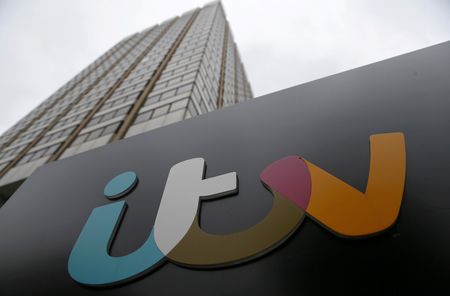By Sarah Young
LONDON (Reuters) -British broadcaster ITV forecast slightly lower ad revenue for 2022 after a weaker-than-expected third quarter, though hits like “I’m a Celebrity… Get Me Out of Here” and the soccer World Cup should help it in the run-up to Christmas.
ITV said on Wednesday 2022 ad revenue was expected to fall between 1% and 1.5% from 2021, a record year, after the first nine months came in just behind its guidance, hurting its shares.
Ad revenue for the nine months to the end of September fell 2%, a slowdown from the half-year, reflecting weaker advertising in the summer compared to 2021 when the Euro Football Championship was delivering record audiences.
ITV had said in July it expected it would be broadly flat.
The stock traded down 6% in early deals, wiping off gains made over the last week, when reality show “I’m a Celebrity… Get Me Out of Here” made headlines daily, particularly by recruiting former health minister Matt Hancock as a contestant.
ITV, which has a Studios production arm as well as its broadcast and digital businesses, said that while the World Cup would help ad revenue in the next two months, there remained a high degree of economic uncertainty, a warning companies could spend less on advertising.
“The third quarter total advertising revenue is light and this leads through to a full-year outlook that is below current expectations, even if the immediate outlook for the fourth quarter is in line with expectations,” Citi analysts said in a note.
For November, ad revenue is seen up 3% and it is expected to be between 5-10% higher in December.
ITV also warned inflation would impact its cost base in 2023 but it said it would try to find ways to mitigate this.
The broadcaster will launch its new ad-funded streaming platform ITVX next month, offering 9,000 hours of programming and backed by a content budget of 160 million pounds next year.
The group’s shares have risen 35% from a two-year low in September, helped by a report saying it was considering selling a stake in its Studios business.
(Reporting by Sarah Young; Editing by Kate Holton and Mark Potter)

